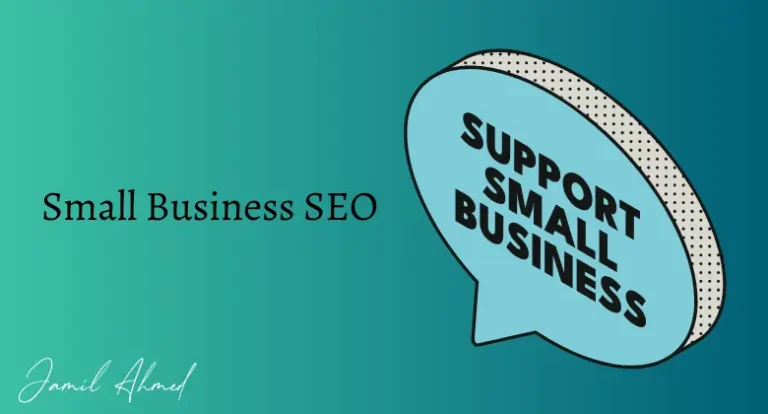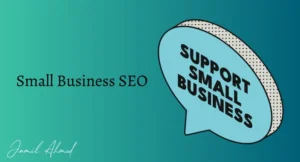Small Business SEO: Why SEO is Important for Small Business?


My step-by-step guide covers everything from defining your brand to creating a website, SEO and using social media to your advantage. Start building a strong personal brand today!
Are you leveraging Small Business SEO to elevate your business’s visibility and establish your authority in the market?
SEO is not just about improving search rankings with your small business website. A strategic move to make your small business stand out in the crowd.
According to StatCounter, Google has a 91.54% Search Engine market share worldwide. In this instance, if you not doing SEO, you are missing money on the table.
Effective SEO strategies give small businesses a competitive edge by helping them rank higher on search engines, attract the right audience, and grow faster
Being visible online isn’t just a bonus; it’s a necessity. That’s where SEO, or Search Engine Optimization, comes into play. Not just a buzzword, but a crucial tool in your business arsenal.
Imagine SEO as a guiding light that leads potential customers right to your doorstep, or in this case, your website. For small businesses, SEO is the secret ingredient that can cook up success.
The focus is not on competing with big companies. Instead, it is about discovering your unique position and ensuring that people associate your name with what you provide.
But what makes SEO so essential for small businesses? It’s about connection and visibility. With the right SEO strategies, your business can appear right where your future customers are looking – on the first page of search engine results.
Think of it as digitally setting up your shop in the busiest part of town. SEO enables you to find, see, and recognize.
And the best part? It’s not just about being visible; it’s about being relevant. SEO helps you reach the people who are already searching for the products or services you provide.
It’s like matching the right puzzle pieces together. This isn’t just about getting traffic; it’s about getting the right traffic.
It’s time to transform your online presence and let the world see the unique story and value your small business has to offer.
Small Business SEO: Why SEO is Important for Small Business?
1. Understanding the Basics of SEO
What is SEO?
SEO, or Search Engine Optimization, is like the art and science of getting your website noticed by people who use search engines like Google or Bing.
It’s about understanding what people are looking for online and then tweaking your website so that it pops up when they search for things related to what you offer. Imagine you have a lemonade stand.
SEO is like putting up signs that lead thirsty people straight to your stand, instead of them wandering off to someone else’s.
Key Elements of SEO:
- Keywords: These are the words or phrases that people type into a search engine. If your website has the right keywords, it’s like telling search engines, “Hey, I have what these people are looking for!”
- Content Quality: This is all about having information on your website that’s useful and interesting to people. High-quality content is like having the best-tasting lemonade that keeps people coming back for more.
- User Experience: This includes how easy it is to use your website. If people find it hard to navigate or it loads too slowly, they’ll leave. It’s like making sure the path to your lemonade stand is smooth and easy to walk on.
- Backlinks: These are links from other websites to yours. It’s like other lemonade fans telling people how great your lemonade is. The more recommendations you have, the more people trust your stand.
SEO for Small Businesses vs. Larger Companies
- Resources and Scale: Big companies often have more money and people to work on SEO, which can mean more extensive and complex strategies. Small businesses usually have tighter budgets and fewer hands on deck, so they need to be more strategic and focused in their approach.
- Local vs. Global: Many small businesses focus on local SEO, which means they’re trying to reach people in their immediate area. This is like putting up signs in your neighborhood for your lemonade stand. Big companies often aim for a global or national presence, which is like trying to get everyone in the city to visit your stand.
- Personalization and Niche Targeting: As a small business, you have the advantage of a more personal touch. You can really get to know your customers and tailor your SEO to very specific groups of people. Larger companies often target broader audiences.
Understanding SEO is like learning how to make your small business the go-to spot for what you offer. It’s about being visible, relevant, and appealing to your potential customers.
Whether you’re a small store or a big business, learning SEO basics is the first step to standing out online.
2. Why SEO is Crucial for Small Businesses in 2025
With more people than ever shopping, researching, and connecting online, having a strong digital presence has become vital for businesses, especially small ones. Here’s why:
- Increased Online Competition: As more businesses move online, the digital space is becoming crowded. This means your small business isn’t just competing with the shop down the street, but potentially with companies across the globe. SEO helps you stand out in this crowded marketplace if you get in search engine results pages.
- Changing Consumer Behavior: Nowadays, when someone needs a product or service, their first stop is usually a search engine. If your business doesn’t show up in these searches, you’re missing out on a huge opportunity to connect with these potential customers.
- Mobile Usage: With smartphones in nearly every pocket, people are searching on the go. Local SEO becomes crucial here, as it ensures your business shows up when someone nearby is searching for what you offer.
The Role of SEO in Reaching Potential Customers
- Visibility in Search Engines: The most obvious role of SEO is to get your business to appear in search engine results. When someone types in a query related to your product or service, you want your business to be on that first page of results. The higher you rank, the more likely people are to click on your website.
- Building Credibility and Trust: People tend to trust websites that appear higher in search results. Good SEO practices help build this trust by ensuring your site is not only visible but also provides valuable and relevant content.
- Targeting the Right Audience: SEO isn’t just about attracting more traffic; it’s about attracting the right traffic. By using targeted keywords, you can reach the people who are most likely to become your customers.
- Cost-Effective Marketing: For small businesses, budgeting is always a concern. SEO is one of the most cost-effective marketing strategies. Unlike paid ads, the traffic from organic search results doesn’t cost you anything per click, and it continues to drive traffic over time.
- Local SEO for Local Businesses: If you run a local business, local SEO helps people in your area find you. This includes optimizing your Google Business Profile, ensuring your business shows up in local searches and on Google Maps, and making sure your website lists your address and phone number.
The role of SEO in the success of small businesses is more critical than ever. It’s not just about keeping up with the competition; it’s about staying ahead of it.
By implimenting SEO for small businesses can maximize their online potential, reach the right customers, and thrive online.
3. The Benefits of Investing in SEO for Small Business
Investing in SEO is like equipping your small business with a powerful tool that unlocks numerous benefits. Let’s break down these advantages:
Key Benefits:
Increased Visibility:
- Being found easily on search engines means more people see your business.
- Improves brand awareness, making your business a familiar name in your niche.
Boost in Organic Traffic:
- Higher rankings lead to more clicks to your website.
- This traffic is often high-quality because it comes from users actively searching for what you offer.
Enhanced Credibility and Trust:
- Websites that appear on the first page of search results are often perceived as more trustworthy.
- Good SEO practices, like providing useful content and a great user experience, build credibility over time.
Better User Experience:
- SEO isn’t just about pleasing search engines; it’s about creating a user-friendly website.
- A well-optimized site is typically more navigable, faster, and easier to use.
Higher Conversion Rates:
- Targeted SEO attracts visitors who are more likely to be interested in your products or services.
- A well-optimized site guides visitors smoothly to conversion points, like making a purchase or signing up for a newsletter.
Cost-Effective Marketing:
- Compared to paid advertising, SEO is relatively low-cost with long-term benefits.
- It’s an investment that keeps on giving, as good rankings can be sustained over time.
Competitive Advantage:
- Outranking your competitors in search results can give you a significant edge.
- SEO helps you compete on merit, not just on size or advertising budget.
Real-Life Examples of Small Businesses Thriving Due to SEO:
Case 1: Local Bakery Increases Foot Traffic
A small bakery in Austin enhanced its website for local searches. They achieved this by incorporating keywords such as “best cupcakes in Austin” and “freshly baked bread near me”.
They also claimed and optimized their Google Business Profile, making them visible on Google Maps.
Result: A 50% increase in foot traffic and a noticeable rise in special orders from the website.
Case 2: Handcrafted Jewelry Store Expands Online Sales
A store that sells special jewelry, like necklaces made of silver and rings made specifically for engagements.
They invested in high-quality content, showcasing their craftsmanship through blog posts and videos.
Result: Tripled their online sales and expanded their customer base to other states.
Case 3: Independent Bookstore Boosts Online Presence
A local bookstore created a content strategy around book reviews, author interviews, and literary events.
They optimized for local SEO and ensured their site was mobile-friendly.
Result: Increased online orders and greater attendance at in-store events, attracting both local and out-of-town visitors.
Investing in SEO is not just a wise decision; it’s an essential strategy for small businesses aiming to grow and succeed in the digital age.
It’s about being where your customers are, standing out in the crowded online space, and building a lasting relationship with your audience. The stories of small businesses flourishing due to SEO are a testament to its power and potential.
4. Exploring Various SEO Strategies
SEO for small businesses, having the right strategies in place can be a game-changer. Let’s delve into some essential tactics that can elevate your online presence:
Targeting the Right Keywords
- Research is Key: Begin with thorough keyword research. Use tools like Google Keyword Planner to find terms that your potential customers are searching for.
- Balance is Essential: Aim for a mix of broad and long-tail keywords. Broad terms capture a wide audience, while long-tail keywords (more specific phrases) attract highly targeted traffic.
- Context Matters: Incorporate semantic search terms related to your primary keywords to cover various user intents and related queries.
Optimizing for Local SEO
- Google My Business Optimization: Create and optimize your Google Business Profile. This is crucial for appearing in local search results and Google Maps.
- Local Keywords: Use location-specific keywords in your website’s content, like “florist in downtown Boston”.
- Local Link Building: Get backlinks from local businesses and organizations to boost your local SEO efforts.
Building a Strong Google Business Profile
- Complete and Accurate Information: Ensure your business name, address, and phone number (NAP) are up-to-date and consistent across the web.
- Engaging Description: Write a compelling description of your business that includes your main keywords.
- Regular Updates: Post updates, offers, events, and photos regularly to keep your profile active and engaging.
Leveraging Social Media for SEO
- Consistent Activity: Regularly post on social media platforms to keep your audience engaged and to drive traffic to your website.
- Use Keywords in Posts: Integrate your targeted keywords subtly in your social media content.
- Engage with Your Audience: Respond to comments and messages. Engagement can indirectly boost your SEO by increasing brand visibility and traffic.
Utilizing Content Marketing
- Valuable Content: Produce high-quality, informative content that addresses the needs and questions of your target audience.
- Blog Posts and Articles: Regular blogging can improve your website’s SEO, especially when using targeted keywords and addressing common questions in your field.
- Diverse Formats: Include various types of content like videos, infographics, and podcasts, which can increase user engagement and time spent on your site.
Technical SEO Aspects
- Website Speed: Ensure your website loads quickly, as speed is a crucial ranking factor.
- Mobile Optimization: With the increasing use of smartphones, having a mobile-friendly website is essential.
- Secure Website (HTTPS): A secure website is not only trusted by users but is also favored by search engines.
Exploring and implementing these SEO strategies can significantly enhance your small business’s online visibility and attractiveness to potential customers.
Remember, SEO is not a one-time task but an ongoing process. Regularly reviewing and updating your SEO strategy is key to staying ahead in the dynamic digital marketplace.
5. Choosing the Right SEO Services
Selecting the right SEO services is a critical decision for any small business owner. It can be the difference between a flourishing online presence and a missed opportunity. Here’s how to make a wise choice:
Understanding Your SEO Needs
Identify Your Goals: Are you looking to increase local traffic, improve overall online visibility, or rank higher for specific keywords? Clear goals will guide you in choosing the right service.
Audit Your Current SEO Performance: Understanding where your website currently stands can help identify what kind of SEO services you need.
Evaluating SEO Service Providers
- Experience and Expertise: Look for companies with proven experience, especially in handling small businesses. Check their case studies and client testimonials.
- Services Offered: Ensure they offer what you specifically need, whether it’s local SEO, link building, content creation, or technical SEO.
- Transparency and Reporting: A good SEO company should be transparent about their methods and provide regular, comprehensive reports on their progress.
Affordability vs. Value
- Beware of Cheap Services: Extremely low prices can be a red flag. Remember, effective SEO requires time and expertise. Very cheap services may use black-hat techniques that can harm your site in the long run.
- Understand the Pricing Structure: SEO services can be priced as monthly packages, project-based, or hourly rates. Choose what aligns with your budget and goals.
- Return on Investment (ROI): Consider the potential ROI. Effective SEO can significantly boost your business, making the investment worthwhile.
Tailored Strategies for Small Businesses
- Personalized Approach: Every business is unique. Ensure the SEO service provider offers a tailored strategy that fits your specific business needs and industry.
- Local SEO Focus: If you’re a local business, the provider should have strong expertise in local SEO, including optimizing for Google Maps and local search terms.
Checking Credibility and Trustworthiness
- Ask for References: Speak with other small business owners who have used their services.
- Look for Certifications and Partnerships: Accreditations from recognized industry bodies or partnerships with major search platforms can be a good sign of credibility.
Long-Term Relationship Potential
- Communication and Support: SEO is a long-term strategy. Choose a company that communicates well and offers ongoing support.
- Scalability: Consider whether the company can scale its services as your business grows.
Choosing the right SEO service provider is a strategic decision for a small business. It’s not just about finding the most affordable option but selecting a service that offers the best value and aligns with your specific business goals.
A trustworthy provider with a track record of success in small business SEO can be a valuable partner in your business’s growth and online success.
6. DIY SEO vs. Professional SEO Services
When it comes to SEO, small business owners often face a critical decision: should they handle it themselves or hire professional SEO services? Understanding the pros and cons of each approach is essential for making an informed decision.
DIY SEO
Pros:
- Cost Savings: The most apparent advantage is the potential cost savings. DIY SEO means you’re not paying for professional services.
- Learning Opportunity: Doing SEO yourself means gaining a deeper understanding of how digital marketing works, which can be beneficial for overall business knowledge.
- Direct Control: You have complete control over the SEO strategies and can make changes as you see fit.Cons:
- Time-Consuming: SEO can be very time-consuming, especially for those new to the field. This time could be spent on other aspects of running your business.
- Steep Learning Curve: SEO is complex and ever-evolving. Staying on top of current trends and best practices can be challenging.
- Potential for Mistakes: Without extensive SEO knowledge, there’s a risk of making mistakes that could harm your website’s ranking or even lead to penalties from search engines.
Professional SEO Services
Pros:
- Expertise and Experience: Professionals bring a depth of knowledge and experience, which means they’re well-equipped to handle the complexities of SEO.
- Time Savings: Outsourcing SEO frees up time, allowing you to focus on other areas of your business.
- Results-Oriented: Professionals are more likely to achieve desired results faster due to their understanding of various SEO tactics and tools.
Cons:
- Cost: Professional SEO services can be a significant investment, especially for small businesses with limited budgets.
- Dependence: Relying on an external team might lead to a dependency, which could be an issue if you decide to manage SEO in-house in the future.
- Variability in Quality: The market is saturated with SEO services, and the quality varies greatly. Finding the right agency or consultant can be challenging.
Cost-Benefit Analysis for Small Business Owners
- Return on Investment (ROI): While DIY SEO saves money upfront, the potential ROI from professional services can be much higher due to more effective and efficient strategies.
- Resource Allocation: Consider the value of your time. If DIY SEO takes away from core business activities, it might end up costing more in the long run.
- Long-Term Value: Professional SEO often provides long-term value, establishing a strong foundation that benefits the business for years.
Choosing between DIY and professional SEO services depends on factors like budget, time, expertise, and your business needs.
Small business owners must consider the immediate costs, long-term benefits, and impact on their operations when making decisions.
Sometimes, it’s good to do some things yourself and let experts handle the harder stuff.
8. Practical Steps to Start Your SEO Journey
An SEO journey can be difficult, but with the right approach, it can also be incredibly rewarding. Here are practical, manageable steps that small business owners can take to start improving their SEO:
1: Website Audit
- Evaluate Current State: Use tools like Google Analytics and Google Search Console to understand your current website performance.
- Identify Issues: Look for common SEO issues such as broken links, slow loading times, or poorly optimized content.
2: Keyword Research
- Find Relevant Keywords: Use keyword research tools to find keywords and phrases relevant to your business.
- Understand Search Intent: Focus on keywords that match the intent of your potential customers – are they looking to buy, to learn, or to find a local service?
3: On-Page Optimization
- Optimize Content: Ensure your website’s content includes your targeted keywords and is informative and engaging.
- Meta Descriptions and Tags: Write compelling meta titles and descriptions that include your primary keywords.
- Improve User Experience: Ensure your website is easy to navigate, mobile-friendly, and fast-loading.
4: Content Creation
- Regularly Update Your Blog: Create a blog and regularly post articles that are relevant to your audience and include your keywords.
- Diverse Content Formats: Consider adding other forms of content like videos, infographics, and podcasts.
5: Local SEO Optimization
- Google My Business: Set up and optimize your Google My Business profile.
- Local Citations: Ensure your business is listed in local directories with consistent NAP (Name, Address, Phone Number) information.
6: Building Backlinks
- Quality Over Quantity: Focus on getting backlinks from reputable sites in your industry.
- Guest Blogging: Write guest posts for other websites in exchange for a link back to your site.
7: Monitor and Adjust
- Track Performance: Regularly check your website’s performance and the impact of your SEO efforts.
- Be Adaptable: SEO is an ongoing process. Be ready to adapt your strategy based on performance data and changing trends.
Wrapping Up: Small Business SEO
SEO is a vital component of any small business’s digital strategy. It’s not just about keywords and rankings. It’s about connecting with your audience, building credibility, and growing your business online. The steps outlined above provide a solid foundation for starting your SEO journey.
Remember, SEO is not a one-time task but a continuous process of improvement and adaptation. It’s always changing, and so are the ways people search and interact online.
Staying informed, being adaptable, and regularly refining your strategy are key to long-term SEO success.
Beginning SEO may seem big, but with small, regular work, your business will flourish online.
Embrace the challenge, learn as you go, and watch as your small business carves out its own space in the vast digital world.
Ready to boost your online presence and become an expert in your field with effective SEO strategies for small businesses?
We are providing affordable Small businesses SEO services with real-time data analysis, reporting, and excellent customer services. Lets Talk.
Small Business SEO FAQs
Navigating the world of SEO can raise many questions, especially for small business owners. Let’s dive into some of the most common inquiries, shedding light on the vital role SEO plays in the success of small businesses.
1. Is SEO Worth It For Small Business?
Absolutely! Think of SEO as an investment rather than a cost. For small businesses, it’s a way to level the playing field against larger competitors.
By optimizing your website and content for search engines, you’re essentially putting up a digital “open for business” sign.
This can lead to increased visibility, more traffic, and ultimately, more customers. So, yes, SEO is not just worth it; it’s crucial for the growth and sustainability of your small business.
2. Is SEO Important For Small Business?
It’s not just important; it’s essential. Most consumers turn to the internet to find products and services.
If your business isn’t visible online, you’re missing out on a huge potential market. SEO helps ensure that when people are searching for what you offer, your business comes up in the search results.
It’s a key tool for building an online presence and attracting customers.
3. Why Is SEO Important For Small Business?
SEO is important because it helps small businesses get noticed in a vast online marketplace. With good SEO, when someone searches for a product or service you offer, your business is more likely to appear in their search results.
This increased visibility can lead to more website visitors, and more visitors can lead to more customers. It’s also about credibility; businesses that rank higher in search results are often viewed as more reputable.
4. Why Is Local SEO Important For Small Business?
Local SEO is a game-changer for small businesses targeting a local customer base. It optimizes your online presence to attract more business from relevant local searches.
This means when people in your area search for a product or service you offer, your business is more likely to show up.
It’s particularly important for businesses that rely on local clientele, like restaurants, retail stores, and service providers.
5. Why Is SEO Important For Small Businesses?
SEO is the digital equivalent of having the best storefront in town. For small businesses, it’s a way to make your voice heard in the crowded online marketplace.
It helps you attract targeted traffic – people who are looking for exactly what you offer. This targeted approach leads to higher quality leads and better conversion rates compared to traditional advertising.
6. Does SEO Work For Small Business?
Yes, it does! SEO can be incredibly effective for small businesses. It helps improve your website’s visibility, which in turn increases traffic and potential sales.
It’s a long-term strategy that can yield sustainable growth. Many small businesses have seen significant improvements in their customer base and revenue by implementing effective SEO strategies.
7. How To Improve SEO For Small Business?
Improving SEO for your small business involves several key steps:
- Keyword Research: Identify keywords that are relevant to your business and that your target customers are using.
- On-Page Optimization: Ensure your website’s content is optimized for these keywords, and that it’s user-friendly and mobile-responsive.
- Content Creation: Regularly produce high-quality, relevant content that adds value for your audience.
Local SEO: If you’re a local business, optimize for local searches, including setting up a Google My Business profile. - Building Backlinks: Gain backlinks from reputable websites to improve your site’s authority.
8. What Is SEO For Small Businesses?
For small businesses, SEO is about tailoring your online presence to ensure you’re visible and attractive to your target audience.
It involves optimizing your website and content to rank higher in search engine results, making it easier for potential customers to find you.
It’s about understanding what your customers are looking for and ensuring that your business is the answer they find.
9. How Much Does SEO Cost For A Small Business?
The cost of SEO for small businesses can vary widely based on your specific needs, goals, and the complexity of your website.
Some businesses may only need a few hundred dollars a month, while others might require a larger investment.
It’s important to remember that with SEO, you often get what you pay for. Investing in a quality SEO strategy can lead to substantial returns over time.
10. Can SEO Help in Building Brand Awareness?
Definitely! SEO is a powerful tool for building brand awareness. By increasing your online visibility, you’re putting your brand in front of more eyes.
When your website appears at the top of search results, it not only brings more traffic but also helps establish your brand’s reputation and credibility.
11. How Long Does It Take to See Results From SEO?
SEO is a long-term strategy, so don’t expect overnight success. Typically, it can take anywhere from a few months to a year to see significant results.
However, the wait is worth it. Once your SEO efforts gain traction, they can provide sustained traffic and growth for your business.
By investing in SEO, small businesses gain a competitive edge not through big budgets, but by using smarter strategies that level the playing field against larger brands.
You May Also Like:





